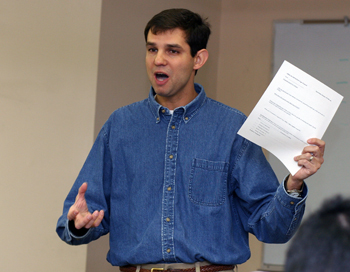The shootings in Arizona have ignited a national debate on political rhetoric. Television talk shows and internet news sites are tackling the issues. Two Wabash College rhetoric professors believe in the power of words but caution against making assumptions.
A gunman opened fire Saturday in what has been described as an assassination attempt aimed at U.S. Congresswoman Gabrielle Giffords. Six people were killed, many more injured, while Giffords remains hospitalized with a gunshot wound to the head.
In the past few days, politicians and pundits have debated the cause and effect of the country’s current political climate.
 “It is valuable that news coverage of the Tucson tragedy is engaged in reflection on the often disturbing nature of our public dialogue because there is value to re-examining how we talk to one another in our public discourse,” said Wabash Professor of Rhetoric Todd McDorman. “However we also should be hesitant to draw strong conclusions about the place of such discourse in acts of violence. Likewise, it should not take acts of violence to create concern over the level of incivility and lack of decency often found in our public discourse.
“It is valuable that news coverage of the Tucson tragedy is engaged in reflection on the often disturbing nature of our public dialogue because there is value to re-examining how we talk to one another in our public discourse,” said Wabash Professor of Rhetoric Todd McDorman. “However we also should be hesitant to draw strong conclusions about the place of such discourse in acts of violence. Likewise, it should not take acts of violence to create concern over the level of incivility and lack of decency often found in our public discourse. “As a culture we should find acts of violence like the one that has occurred in Tucson to be abhorrent. We should be more mindful of our public rhetoric and be cautious about asserting too strong of a link between the two without more evidence.”
McDorman added that sometimes violent metaphors sneak into our everyday conversation. He used an ESPN.com article he had read about this weekend’s Pittsburgh- Baltimore NFL playoff game as an example.
“The author and game participants refer to the upcoming game as a ‘battle,’ as ‘Armageddon,’ and as ‘World War III.’ Obviously it is none of those things but it is an example of how we use aggressive rhetoric to express our sentiments.”
While acknowledging the words are used in a casual manner, he noted the participant’s intent to make their language more colorful and ideas more memorable. “But is it possible that there could be negative implications to such talk, which reflects the type of questions that are now being raised about the possible association of violence and polarized political talk?”
 Both professors were careful to add that it’s always going to be difficult to draw a direct connection between rhetoric and action.
Both professors were careful to add that it’s always going to be difficult to draw a direct connection between rhetoric and action.
“Of course, we cannot know what role rhetoric may have played in the Arizona shooting,” Professor of Rhetoric Jennifer Abbott said. “But we do know, more generally, that the rhetorical choices made by any public figure contribute toward an overall discursive climate or atmosphere. And that atmosphere seems to have become rather vitriolic and polarizing in our country.”
Abbott adds that a connection between symbols and action is fuzzy but a connection likely exists. “The words and images we use to label and characterize a person or group frames the way we view them,” she said.
“Every frame invokes an attitude. Calling someone an 'enemy,' for example, suggests a more oppositional attitude than calling the person a 'disputant,' 'interlocutor,' or even 'debater.' "
She quotes literary theorist Kenneth Burke, who believes an attitude is an incipient action. Abbott added it’s no leap of logic to assume words shape attitude and possibly actions.
“We can never draw a linear path from a single word-choice to an action, of course, but we can reasonably conclude that the discursive choices a person or, to some extent, a society makes encourage some actions while discouraging others,” Abbott explained. "There's a reason, for example, that war rhetoric typically employs words and images that dehumanize the opponent. Such discourse encourages (and even rationalizes) violence, rather than generous acts of charity and humanity toward the opposition."
While the national debate centers on name calling and symbols like the crosshairs on Sarah Palin’s website targeting Congressional district candidates, McDorman said rhetorical scholars have long advocated paying more attention to the power of such actions.
“Too often the metaphors we appeal to have deeper connotations than we might initially realize and we often appeal to metaphors of war and aggression without thinking about their possible meaning,” he said. “That is, we become so accustomed to talking in such a manner that we forget about the underlying meaning or message of the language we use. Think, for instance, of how often we characterize a discussion of two possible actions, or even a political campaign between opponents, as a 'war.' Again, this isn't to say that the rhetoric is connected to the action taken in this case but it is accurate to say that our public rhetoric has a tendency toward verbal violence if not actual violence.”
 “It is valuable that news coverage of the Tucson tragedy is engaged in reflection on the often disturbing nature of our public dialogue because there is value to re-examining how we talk to one another in our public discourse,” said Wabash Professor of Rhetoric Todd McDorman. “However we also should be hesitant to draw strong conclusions about the place of such discourse in acts of violence. Likewise, it should not take acts of violence to create concern over the level of incivility and lack of decency often found in our public discourse.
“It is valuable that news coverage of the Tucson tragedy is engaged in reflection on the often disturbing nature of our public dialogue because there is value to re-examining how we talk to one another in our public discourse,” said Wabash Professor of Rhetoric Todd McDorman. “However we also should be hesitant to draw strong conclusions about the place of such discourse in acts of violence. Likewise, it should not take acts of violence to create concern over the level of incivility and lack of decency often found in our public discourse.  Both professors were careful to add that it’s always going to be difficult to draw a direct connection between rhetoric and action.
Both professors were careful to add that it’s always going to be difficult to draw a direct connection between rhetoric and action.